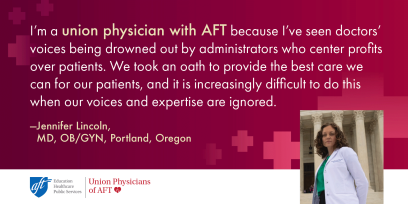On June 18, the AFT announced the launch of the Union Physicians of AFT, a dynamic new group aimed at uniting doctors. Faced with crippling burnout from administrative overload, frustration over financial barriers affecting their patients’ capacity to pay, and lack of respect from corporate owners who put profits over patients, they’re organizing with the AFT to fight back and make their voices heard.
Despite the glaring issues in the healthcare sector, less than 10 percent of U.S. doctors have unionized. This new initiative will focus on organizing doctors across the country. In the past year alone, more than 3,200 doctors from New York to Oregon have joined the AFT, making it the fastest-growing healthcare union and the second-largest nurses union in the U.S.
Amid a rapidly evolving healthcare landscape, the AFT is dedicated to securing better wages, benefits, and work schedules that reflect the demanding nature of the medical profession. By improving doctors' well-being, the AFT aims to attract and retain talented healthcare professionals, ultimately enhancing patient care.
Dr. Bryce Pullian, an emergency physician at Providence Medford (Ore.) Medical Center, shared his experiences. “We joined the AFT to form our union last spring because we were losing our ability to provide the care our ED patients deserve,” he said, noting that increased burdens on providers, dwindling outpatient resources, and rising patient volumes were leading to longer wait times in the emergency department; and working conditions made it difficult to recruit and retain staff.
Pullian recounted two incidents that cemented their decision to unionize: The administration proposed eliminating overnight ICU physician coverage, leaving a single ER physician responsible for both the ER and ICU nearly a quarter of a mile away, and cutting overnight ultrasound coverage with just 48 hours’ notice.
“These decisions were made without our input, despite us being the ones who best understood the situation. Our efforts to communicate with management were met with platitudes or worse, silence,” Pullian says. “We knew that we had to do something drastic to change the situation or else we would be complicit in allowing these changes to take place, so we decided to form our union. We saw our union as a means to guarantee that we had a seat at the table with management to advocate not only for ourselves, but more importantly for our patients.”
Dr. Jahnavi Chandrashekar, a hospitalist at Providence St. Vincent Medical Center in Portland, echoed these sentiments. “When I joined St. Vincent's, I very quickly realized how lucky I was to be part of a group of physicians who were not only passionate about the quality of their work, but also fostered a sense of camaraderie within the group, and as a consequence, had a great record of physician retention,” she said. “Over the years, our group has grown quite a bit to meet the demands of our community. And with that growth, we've seen a steady increase in the acuity of our patients. Unfortunately, we also noticed our hospital system shift more and more towards a corporate mindset and begin to prioritize profit over patients.
“We feel strongly that it is our ethical imperative to speak up for our patients, our community and ourselves. And having a seat at the table, we recognize that we also have the privilege and responsibility of shaping what hospital medicine looks like for future generations. It's so important that we create a hospital culture that is safe not only for patients, but also for those of us caring for them.”
Dr. Jessica Leuchtenburg, an internal medicine resident at the University of Maryland Medical Center in Baltimore, highlighted the unique challenges residents face. “We are both doctors and learners, yet we have no negotiating power regarding our contracts. We work extreme hours, often 24- to 28-hour shifts,” says Leuchtenburg. “We organized to fight for pay parity, parental leave and retirement benefits. We needed to advocate for better working conditions to ensure we could provide the best care for our patients.”
AFT President Randi Weingarten emphasized the broader issues doctors are confronting: burnout from administrative overload, financial frustrations, workplace violence, staffing shortages, and a lack of respect from corporate leaders detached from patient care. “These challenges are widespread in healthcare, but now doctors are organizing to fight back,” Weingarten says. “This initiative will help improve the future of our broken healthcare system.”
[Adrienne Coles]

